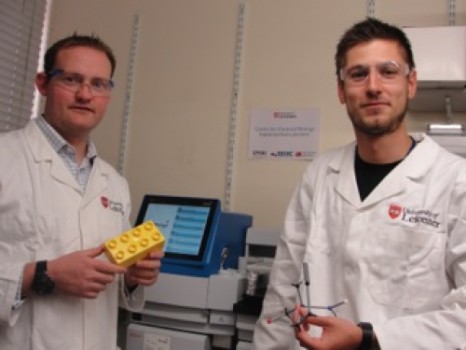
Chemists at the University of Leicester have reported a breakthrough in techniques to develop new drugs in the fight against diseases such as cancer and Alzheimer’s.
The team has developed an innovative process allowing them to generate a particular type of synthetic amino acid — and a particular type of designer protein — that has not been done before.
The advance is announced by the Jamieson Research Group in the Department of Chemistry at the University of Leicester. Their work, funded by the Engineering and Physical Sciences Research Council (EPSRC), is published in the Royal Society of Chemistry journal Organic and Biomolecular Chemistry.
Dr Andrew Jamieson, lead scientist, said: “We are very proud of this research, it has taken several years of hard work to master the chemistry techniques to create these new building blocks but now that we have conquered it we have access to new building blocks that people have only ever dreamed of before!”
Amino acids are Mother Nature’s building blocks. They are used to make all proteins and so are essential for life, however Mother Nature only uses twenty of these building blocks. The Leicester research involves the chemical synthesis of unnatural amino acids that can be used to make unnatural mini-proteins with new 3D structures and importantly new functions.
Dr Jamieson said: “We are particular interested in using our new building blocks to develop innovative new protein drugs for the treatment of cancer and Alzheimer’s disease.
“Unnatural amino acids, the building blocks, are described as chiral, meaning they have “handedness.” A robust synthesis to selectively produce molecules with a particular handedness has not previously been reported.
“Our new practical method allows us to selectively synthesize only the “right handed molecules.”
“This new research is important because it has uncovered a new, easier and quicker way to make these building blocks which can be used to make new drugs. We now have access to new building blocks to develop innovative new protein drugs for the treatment of disease.
“We are actively using these building blocks to develop new treatments for cancer and Alzheimer’s disease. We have also had a summer student use the building blocks to synthesize a toxin produced by a sea snail, and hope to develop this as a new pain killer.”
Dr Jamieson said innovative new strategies are required for drug discovery that can provide highly potent drugs with no side-effects. Access to these new building blocks is the first step in developing their innovative new protein drug strategy.
Story Source:
The above story is based on materials provided by University of Leicester. Note: Materials may be edited for content and length.
Journal Reference:
- Andrew George Jamieson, Boris Aillard, Naomi Stephanie Robertson, Adam Baldwin, Siobhan Robins. Robust Asymmetric Synthesis of Unnatural Alkenyl Amino Acids for Conformationally Constrained α-Helix Peptides. Org. Biomol. Chem., 2014; DOI: 10.1039/C4OB01832J
